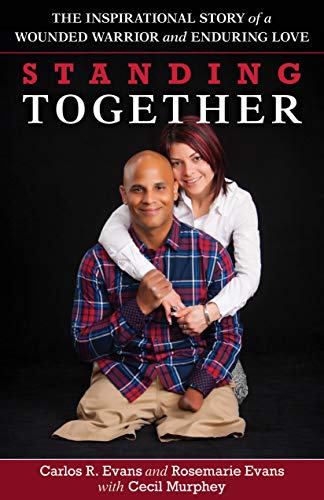Sustaining a military marriage is hard work, especially when deployments keep a family separated for prolonged periods of time. The strain is intensified when the serving spouse is injured in the field. According to the PTSD Foundation of America, an estimated two out of three marriages fail for troops suffering from combat trauma. Carlos R. Evans and Rosemarie Evans are well aware of the difficulties, having experienced them personally. Carlos was a Marine stationed in Afghanistan when he stepped on an IED. As a result, he lost use of both legs and his left hand. When he arrived at Bethesda Medical Center, it was just the beginning of a long road to recovery which would not only involve facing a severe injury and rehabilitation but post-traumatic stress disorder and addiction.
Defying the odds, Carlos and Rosemarie built a stronger marriage though it was difficult. Here’s Rosemarie’s story:
During the first weeks after Carlos’s accident, our concern was his survival and his getting better. In those days, I didn’t think much about our marriage. Besides taking care of Carlos I felt overwhelmed trying to be a mother, separated from my two daughters, and my needing to be at Walter Reed with Carlos.
Learning to Relate Again
But once our family was reunited and we lived in an apartment, our lives began to take shape, and I thought about our marriage. Part of the reason was that I observed the way other couples related (or didn’t relate) to each other.
The hospital set up several occasions for interacting with others. Going there five days a week with Carlos, which included a lot of waiting, I met wives of other amputees. We got to know each other, and in many ways, we formed an informal support group.
“Does your husband . . . ?” was a common topic as we related the way our spouses reacted to amputation, the PTSD, and the medication. Once we got to know each other, some of the women began to talk about their marriage.
Jesus Makes the Difference
I’ve lost track of the many, many complaints from other wives—and they were legitimate. All of us were under stress, and some more than others. And the stress didn’t always depend on whether the soldier lost one leg or was a quadriplegic. Some people simply aren’t built to handle stress. And I want to make it clear right here that I would have been one of them if it hadn’t been for Jesus Christ in my life.
No matter how bad things got—and sometimes they were enough that I asked myself if it was worth staying married—I had Christian friends. They were the members of our home church, my family, and Carlos’s family. Not that we told them everything (which we didn’t), but I could count on them. I’ve already mentioned several people God used to minister to us when we didn’t know where to turn, such as Tamara.
Carlos and I had a strong, spiritual foundation. Not every couple had that, and stress brought their lack of it to the forefront. Sometimes—all too often—those relationships ended in divorce.
A complaint I heard often was about the lack of intimacy—not just sexual intimacy but the sharing of hearts with each other. “My husband has become a stranger,” more than one wife said to me. “I used to know him, but he’s changed, and I can’t figure him out.”
I tried to listen and offer suggestions when I could, but I had my own struggles with marriage. Those two years in Washington, DC, tested our relationship more than any other time.
We interacted with a few stable couples, but only a few. Most of them were already in fragmented relationships. “We’re married, but it’s like we’re living separate lives,” one woman said. “I don’t know how he feels about anything.”
Coping With Stress
Some of the wives turned to medication. “I’m deeply depressed,” was a common complaint. In time, some of those women became dependent on narcotics.
Other couples stayed together because of the money. The husband would be discharged with full medical benefits, a good pension, and the assistance of wonderful, compassionate organizations that provided a van and often a house. Too often the wives stayed for the security and the benefits. Or sometimes they said, “I’d leave him right now except for the children.”
On the few occasions when I mentioned my stress, a common response was, “You should get something to calm you down.” They meant prescription drugs—which were available for us.
“No, no,” I said each time. “If I start on those narcotics, how am I going to help Carlos get through this? He needs me fully alert.” Or sometimes I would say, “I have two very young children. Who’s going to take care of them?” They had answers, but none of them seemed right to me. I would say to myself, God is with us, and he has promised never to leave or forsake us.
My emotions were up and down, and I was aware of it. I once told Carlos, “If I had followed only my emotions, I would have left you. Several times I got to the place where I told God, ‘I can’t take any more.’ But the Lord always comforted me and kept me going forward.”
I heard of one wife who left a note on the bed for her husband when he woke up. “I can’t do this any longer, so I’m leaving.” Another wife left a note that said, “I didn’t sign up for this kind of life, and I can’t take it.” She left while her husband was undergoing physical therapy. I’d hear it as gossip among other wives, as if they were saying, “She’s a bad woman leaving him like that.” And yet, I knew some of them really didn’t think the woman was bad, and they themselves probably would have left if they could.
Keeping Your Promise with the Help of God
I don’t want to judge them. It wasn’t easy for our wounded spouses, and it wasn’t easy for us as wives. Only those who go through such circumstances can truly understand the decisions some of the women made. But I was determined not to be someone who walked away from my husband and my promises. When he snipped at me, when I was exhausted, trying to figure out how to pay the bills, always I went back to the foundation of our relationship. Perhaps I sound like I’m preaching, but I learned that we can endure what seems impossible to go through if the Lord is with us.
God is love, which we all acknowledge, and if our relationship is founded on love for him and for each other, we can make it.Click To TweetGod is love, which we all acknowledge, and if our relationship is founded on love for him and for each other, we can make it. No matter what happens, God is still with us. Carlos and I had each other, our supportive families, and our church family. That has been the foundation of our life together, and it has helped us stay together.
Carlos likes to quote Song of Songs 8:7: “Many waters cannot quench love; rivers cannot sweep it away. If one were to give all the wealth of one’s house for love, it would be utterly scorned.”
Adapted from Standing Together: The Inspirational Story of a Wounded Warrior and Enduring
Love , Copyright © 2019 by Kregel Publications, Carlos R. Evans and Rosemarie Evans (written with Cecil Murphey












